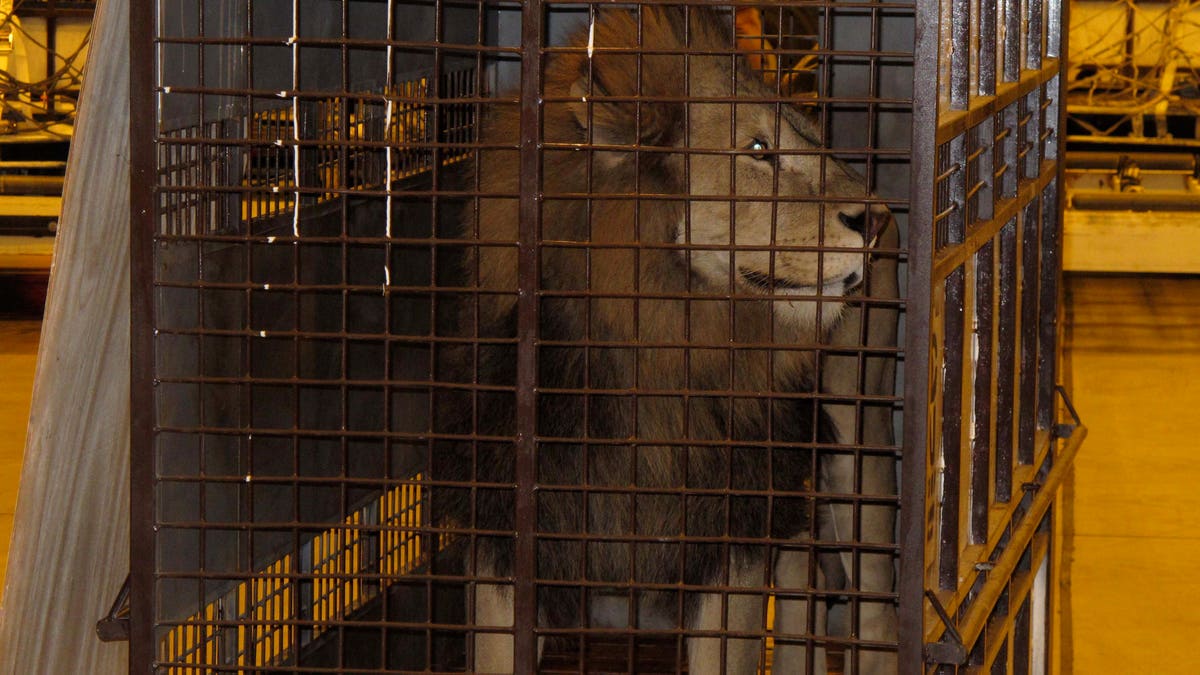
Twenty five Bolivian lions arrived at The Wild Animal Sanctuary in Keensburg, Col., last week after their home country banned the use of animals for entertainment. (FNC)
Twenty five lions from Bolivia aren't just adapting to a new language, but a whole new existence.
Rescued, after their home country banned the use of animals for entertainment, the lions touched down last week on American soil, in a DC-10 chartered by Animal Defenders International (ADI).
Now lounging in a transitional enclosure, built specifically for their arrival at The Wild Animal Sanctuary in Keenesburg, Colorado, they're experiencing many firsts: the feel of grass and trees, room to play on large logs, heavy duty zoo balls and... no tricks on command or punishment.
Described as skinny and malnourished, each is being served specially mixed, 10-pound blocks of meat and nutrients, six to eight times per day, so they can muscle-up for what's next. After an adjustment period, they'll spread out across four separate 20-acre habitats (80 acres total). The outdoor space will include underground dens that will stay 60 degrees, year round.
Click here to see a slideshow of the lions and their new home.
"They're all adapting very well, they're eating very well, they're drinking very well and getting along tremendously," Shawna Finkenbinder, the sanctuary's public relations director, told FoxNews.com.
After spending not even 48 hours at the sanctuary, the lions already showed signs of settling into routines.
For example, Kimba, who never socialized with other lions and spent his entire life in a cage that had to be broken apart with a saw and sledge hammer to free him, could be seen napping in front of a heating duct, waking to casually wander to the water trough, communicating (loudly) to his neighbors, and stashing meat in a corner for safe keeping.
"These guys actually know we're not here to hurt them... but we will respect the past they've had and we will slowly speak with them and get them comfortable with us, at their pace," Finkenbinder said.
Like the others on the property, the Bolivian lions can't go back to the true wild, for their own sake as well as the environment.
"They would have a hard time living in the wild because they've been raised in human hands their entire life ," Finkenbinder said. "They may not be able to fend for themselves or be able to take care of themselves."
In a number of cases the natural order of chromosomes also were unnaturally altered, as Siberians were bred with Bengals to produce more show animals.At the sanctuary however, females get birth control implants.
But even with mating in check, the rescue operation continues to grow. It now covers 320 acres with about 290 carnivores and omnivores and is constantly being contacted for placement as laws are passed, illegal operations are shut down and cuddly babies outgrow their surroundings, Finkenbinder said.
"We're hoping by being open to the public, we can teach everybody, that they don't belong in human hands and they don't belong as pets."
The Bolivian Lions came to Colorado through Operation Lion Ark, which is organized by ADI. The organization has been running undercover investigations for a few years, following circuses through South American countries, ADI Legal and Political Advisor Corey Evans told FoxNews.com.
Click here to see the ADI Rescue Diary.
"The circus industry is fraught with animal cruelty. It's endemic, because you're getting a situation where you're having wild animals and you're putting them into small enclosures and you're asking them to perform unnatural acts and to do that, as you would imagine, you need the threat of force and punishment,"he added.
ADI publicized the evidence it gathered in Bolivia, leading to a bill banning use of wild and domestic animals in circuses, the first of its kind law in the world. Some circuses responded by abandoning animals in a town square, some tried to run, and others only turned over animals after being confronted by law enforcement officials.
When the roaring cargo from Bolivia finally unloaded in a hangar at Denver International Airport, the lions got a red carpet quality greeting by CSI actress and ADI ambassador Jorja Fox and former host of The Price is Right, Bob Barker, who funded the rescue.
Barker also has set up endowments for the study of animal law at law schools. As he awaited the special flight, he said, "we're opening the doors and we hope to continue opening doors until every country in the world has banned circuses that feature animals."
